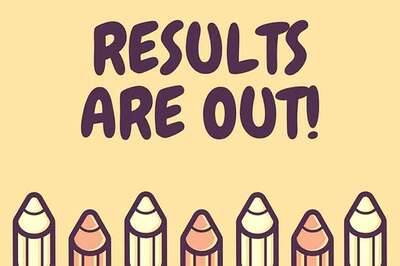
views
Finding Balance

Put on the brakes. Every relationship develops at its own pace, and there's no need to fast forward to being "soul mates" or "best friends forever" just because things feel great. Cherish the novelty of it all and the excitement of having something new, because it'll never be new again. It can be nerve-wracking not knowing how a certain connection is going to unfold, but it's also exciting! Be patient and learn to savor that excitement. Don't try to push the connection into a stage that it's not ready for, or you'll miss the fun and create stress. If you had a blast when you went out on Friday night, you probably can't wait to replicate the experience as soon as possible. However, instead of calling up your friend first thing Saturday morning to make more plans, give it a few days. Savor the fun time you had and give your friend the chance to savor it, too. When it's time to hang out again, you'll both have had the chance to actually look forward to seeing each other, making your time together all the sweeter.

Take off the rose-tinted glasses. Part of the reason people get disproportionately excited sometimes is because we tend to idealize others in the very beginning of a relationship. When you first meet someone with whom you have a connection, it's so easy to get lost in fantasies of how awesome your friendship or relationship might be. However, with those fantasies come high expectations, and sometimes those expectations are unrealistic! Right now you might think you want to spend all of your time with the person, but you're setting yourself up to be let down. Make it a point to remind yourself that this new person in your life is human, which means they're not perfect. Avoid putting them on a pedestal. They will make mistakes, and you need to be ready to cope and forgive, rather than act shocked that the person dares to be anything but perfect.

Practice quid pro quo (a Latin phrase for "this for that"). Imagine your interaction with this person is like a tennis or volleyball game. Every time you initiate contact, you throw the ball to their side of the court. Then, you have to wait for them to send it back. You don't toss a whole bunch more just to make sure he or she is still interested in playing. If you're a little on the needy side, you probably get nervous and worried while you're waiting. When this happens, take a deep breath. If you've already gotten in touch with someone (you sent them an e-mail or text message, or you gave them a call and left a voice message) there's no need to do it again. Whenever you do get the urge to contact them again, remember that there are only a few possibilities here: They haven't gotten the message yet. They've been too busy or preoccupied to get back to you. If you trust this person, then you have to give them the benefit of the doubt and assume this is the case. They aren't interested in hanging out at the moment.

Don't be suffocating. No matter how close you are to another person, spending all your time with them is going to get overwhelming. Even if the person loves you, he or she is not going to want to be with you at every waking (and maybe sleeping) moment. If you find it difficult to be away from the person for even a few minutes, you're almost definitely creating a situation that will eventually blow up in your face. As hard as it might be, force yourself to back off and give the person some space. Spend a few nights away, do activities you like to do, and don't call or text for a bit. Your relationship will definitely improve because the old adage that "absence makes the heart grow fonder" is true. If you make the person feel confined or responsible for your life, it is going to push them away.

Recognize signs that the other person is no longer interested. It happens sometimes for a variety of reasons, but one thing is for sure--showering the person with more attention will never change their mind. Persistence is not the answer! Pulling away may be the person's way of jumping ship without confronting you. Any prodding from you won't change the way they feel, and deep down inside, you know that. If someone doesn't have the decency to respond, they're not worth your time. You deserve better than that. Think about whether the person is acting fickle. Some people just aren't good about maintaining a friendship or relationship, and sometimes they're lazy, or forgetful. More often, though, if someone isn't responsive, it's not because they forgot to call you back - it's because they made a choice not to. It might be that the other person just needs some time to focus on other things for a while. It doesn't have to mean the end of your relationship.

Respect the other person's wishes. Getting ignored or iced out can feel like rejection - well, it is rejection, and that really hurts. But once someone has decided they're ready to move on, there's nothing you can do to force the issue. Do your best to move on and resist the urge to be pushy. Lashing out or trying to hurt the other person in return will only make the person grow even more distant.

See if your needs are being met. If the person on your mind doesn't flat-out reject you, but he or she demonstrates flaky behavior and seems to be leading you on, think about whether you really want this person in your life. Just because you want to spend time with your friend or significant other doesn't make you "needy." All relationships require some time and effort to maintain. If the person is making you feel like you're asking for too much, but you know you're not being excessively needy, then maybe it's the other person who has a problem. Decide how much time and attention you want to give the relationship, and figure out how much you expect in return. If your expectations are reasonable, but you're always feeling let down or neglected, it might be time to find a new friend or significant other who makes you feel valued and cared for. Relationships aren't easy to balance - it often seems like one person is putting in more effort. It's normal to have phases where one person is often busy and the other one seems to be calling and texting more. However, if this is a constant pattern in your relationship, and you don't think it's going to change, get out of the relationship before it hurts your self-esteem.
Boosting Your Confidence

Get busy doing other things. Busy people simply don't have enough time to be needy; they're always preoccupied with other things, and guess what? Those other things are what make people more interesting friends and romantic partners. If you have nothing better to do than to wait for someone to call or write back, then you're probably bored (and you know what they say - if you're bored, you're boring). What are you waiting for? Have your own goals and desires, and learn to enjoy your life when you are by yourself. Widen your scope. Go volunteer. Learn to dance. Go for a run. Learn to oil paint. Join a club. Put yourself out there, apply yourself, and have fun! All your worries will fall away, and if and when the person gets in touch, it'll be a delightful surprise, not a frantic relief!

Call other people once in a while. Focusing your life around just one person isn't good for your mental health or self-esteem. Create habits and routines of being social, of going out and connecting with people. Call other people in your group of friends instead of pouring all your energy into one person! Get some people together to go to a movie or out to dinner, and don't spend the whole time worrying about that person. Enjoy all the other personalities that fill your life - you have room for more than one friend.

Know that it's OK to be single. Many people remain single and still enjoy their life to the fullest. They have freedom and fun, and in many cases they are just as happy as people in a relationship. The deeper truth is that having a relationship is a want, not a need. The problem comes when you make it a need and start believing that you can't survive without it. Try this exercise: when a needy thought comes into your head, repeat a mantra to yourself. Say "I am strong," or "I have everything I need." Repeat something in your head that helps you feel like a whole person who doesn't need anyone else to live. Listening to music and watching movies about freedom and strength can also help.

Work on your self-esteem. Odds are, if you struggle with neediness, you're probably a little lacking in the self-esteem department. People often get needy when they overvalue another person in their life and stop valuing themselves. You might be looking for someone to make you feel better about yourself, but the fact is that you are the only person who can really do that. You shouldn't base your happiness on someone else. Sure, it's okay for someone to make you happy, but if they're your only source of happiness, you might become angry or sad whenever they're not around, and that can be very demanding for the other person! It makes them feel guilty, obligated and eventually, resentful towards you. One way to get rid of neediness is to prove to yourself that you don't need anyone by doing things by yourself, or being single, for an extended period of time, until you feel confident. Act like you want a best friend or significant other, but you definitely don't need them. Try not to seek out a new relationship until you're sure you won't fall into the same old patterns.

Learn to trust. Once you sort out what's going on inside, you can deal with any issues you might have relating to other people. Neediness is often associated with a shortage of trust, and sometimes a fear of abandonment. When you find yourself doubting someone's feelings for you, or their loyalty, ask yourself why you don't trust them. Is it because they did something questionable? Or is it because someone in your past hurt you, and now you think this new person is going to do the same thing? If it's the latter, then remind yourself that it's not really fair to judge one person by another person's actions, is it? If you really care for this person, and they've earned your trust, give it to them.

Reap the benefits of being independent. Being secure and non-needy makes you more attractive. It's like a trick: the more secure and non-needy you genuinely are, the more attractive you become. Once you're really independent, you'll know it. You'll be confident enough to handle relationships without worrying excessively about what the other person thinks. You'll cherish your alone time as much as your time with the person you love.

Understand that the human mind is inherently needy. Our mind is pretty hyperactive as it always wants to do or acquire something and when you don't have something to do that's when you feel needy or bored or frustrated. It is, therefore, a pragmatic practice to channel that neediness/hyperactivity into activities that you enjoy, such as seeking new activities, following your passions, relationships, etc, help in dealing with neediness, but temporarily. People who seem non-needy are simply acting out their mind's activeness constructively and/or creatively in other areas of life, or they have their want or need to be satisfied through another person. Consequently, when you meet them, they seem non-needy and attractive. For example: People who have good friends don't seem to be needy, especially when it comes to making new friends, because they already have that aspect of 'want' satisfied. Another example would be that people who enjoy their job come across as non-needy, especially while on the job because they are channeling their mind's hyperactivity through their job. Similarly, if a guy is in a good relationship, he doesn't feel needy in front of other girls because he's already getting that 'want' satisfied from another person. As a result, he seems pretty non-needy and that's the reason other people feel attracted to him. It's a researched fact that guys who are already in a relationship are attractive to others. What's the commonality in all of the above? They are all fleeting external factors. Which means remove that 'external factor' and the mind will become needy again, at least in that aspect. For example: moving to another city away from your friends, losing your job, breaking up with your partner, etc. This does not mean not to seek activities, go out with friends, have a relationship, etc. In fact, these are pragmatic ways to channel the mind's hyperactivity/neediness, and can be part of the journey to becoming truly non-needy; but ultimately, each person has their own journey. True non-neediness comes when you stop seeking fulfillment externally because you realize that none of the fleeting external factors can satisfy you. You may continue to follow your passions, hang out with friends, relationships, etc., just because you enjoy them; but you won't seek fulfillment in them. You become simple and humble, like an ocean. "All streams flow to the sea because it's lower than they are, humility gives it its power". Tao Te Ching. If you are feeling uncertain, congratulations.


















Comments
0 comment